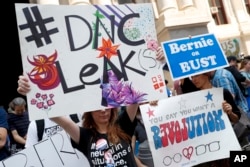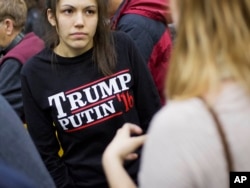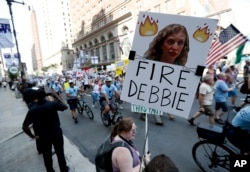As Democrats try to contain the fallout over an embarrassing email leak, many in the party are trying to shift the focus toward a familiar foe: Russia.
Top Clinton officials on Monday took the extraordinary step of accusing Russian hackers of trying to interfere in the U.S. election by releasing the Democratic National Committee emails.
Some veteran party strategists and ex-Clinton aides suggest the Clinton campaign will continue to use the issue to raise questions about Trump's links to Moscow.
WikiLeaks released the 20,000 DNC emails last week, just before the start of the party's national convention that got underway Monday in Philadelphia.
The 20,000 emails confirmed the fears of many supporters of Vermont Senator Bernie Sanders, who had claimed the party was tipping the scales in favor of Clinton.
WikiLeaks, a transparency advocacy group, did not reveal the source of the leaked emails. But many pointed a finger at Russia, after the DNC said last month that Russian hackers had penetrated its systems.
Reporters asked Russian Foreign Minister Sergey Lavrov about his country's purported involvement in the hack after Lavrov met with U.S. Secretary of State John Kerry at an Association of Southeast Asian Nations (ASEAN) meeting in Vientiane, Laos. While he avoided directly responding to the issue, Lavrov said that he doesn't "want to use four-letter words."
Kerry told reporters that he had raised the issue of DNC email hacking with Lavrov, but didn't divulge any details beyond that. Kerry said the FBI is investigating the hack, and it would be premature to draw any conclusions before the investigation is finished.
Helping Trump?
Not all experts agree that Russia can be easily implicated. Yet, Clinton's campaign on Monday took it a step further, arguing that Russian hackers released the emails to help Donald Trump, the Republican nominee.
"I don't think it's coincidental that these emails were released on the eve of our convention here, and I think that's disturbing," Clinton campaign manager Robby Mook told CNN.
Speaking later on the same network, Clinton spokesman Brian Fallon said, "There's plenty of reason to think there's an affinity between [Russian President Vladimir] Putin and Trump."
Many Democratic strategists say they expect Clinton's team to continue to point to Trump's Russia ties, arguing it could weaken the Republican candidate in the eyes of many Americans.
"It would be political malpractice not to" highlight Trump's Moscow connection, says Michael Trujillo, who served as a Clinton aide in 2008 and as a senior adviser to the Ready for Hillary Super PAC in 2012-13.
Trump's Russia connections
There have long been questions about Trump's relationship with Moscow.
Trump and Putin have been complimentary of one another. "He [Trump] is a very flamboyant man, very talented, no doubt about that," Putin said last December.
"Wouldn't it be nice if, like, Russia and us could knock out an enemy together, not us bear the full costs?" Trump asked at a rally in Iowa later that same week.
The New York businessman is said to have extensive business links with many oligarchs close to Putin.
Trump's campaign manager, Paul Manafort, worked as a public relations consultant for Ukraine's pro-Russia president Viktor Yanukovych before the Ukrainian strongman was ousted and fled to Moscow in 2014.
None of that seemed to matter much in the 2016 election until last week, when several journalists began raising questions about Trump's more recent behavior toward Moscow.
Most notably, Trump said if he became president, the U.S. might not back NATO nations if they were to come under attack from Russia, reversing a decades-long U.S. foreign policy stance. Trump's staff also worked to soften anti-Russian language in the Republican platform last week during the party's convention.
While all of this is circumstantial evidence, and nothing points at a direct link between Trump and Putin, some Democrats say it is too much to ignore.
"You know, sometimes circumstantial evidence can convict people," said Bob Schrum, a Democratic strategist and veteran of numerous presidential campaigns.
Stranger than fiction
"I don't want to rush to judgment, but I think the burden of proof here is … on Trump to explain why he and Manafort have so many close ties to people who are around Putin," said Craig Varoga, a longtime Democratic strategist.
Varoga, who has worked in Democratic politics for 30 years, says he's never seen an accusation quite like this one. "The plot here is potentially wilder than ‘The Manchurian Candidate,’" he said, referring to a best-selling political thriller that came out in 1959 in the midst of the Cold War.
Trump took to Twitter on Monday to dismiss the controversy as a "joke," but acknowledged in the same tweet that "Putin likes me."
In an interview, Manafort called the accusations "absurd," adding "there's no basis for it."
No U.S. government official has said who is behind the DNC email leaks. There have been no official accusations that Russia is behind the disclosure.
The FBI said Monday it is "working to determine the nature and scope" of the hack. "A compromise of this nature is something we take very seriously, and the FBI will continue to investigate and hold accountable those who pose a threat in cyberspace," it added.
While some U.S. officials, speaking off the record, have described the attack as part of a wider series of Russian cyber intrusions into U.S. political and academic systems, some cyber experts expressed skepticism.
It is nearly impossible to determine who carried out such a cyberattack, says Jeffrey Carr, author of “Inside Cyber Warfare.”
"The technical evidence can all be faked," Carr said. "When you look at a piece of malware, you're looking at what the author of the malware wants you to see.
"It's like finding a gun at the scene of a shooting that was made in Russia. We don't assume it was a Russian shooter," he said.
There's also a matter of language, Carr says. "We say Russian hackers, and then we immediately assume it's the Russian government."
'Disturbing'
The chairman of the Democratic Party became the first casualty of the email controversy, when Debbie Wasserman Shultz announced she would step down. Trump criticized her for favoring Clinton over Sanders.
"She worked very, very hard to rig the system," Trump said. "Little did she know — China, Russia, one of our many, many friends, came in and hacked the hell out of us."
The issue does not appear to be going away, and it's not just Democrats who want to know more about Trump's links with Russia.
When asked whether he thinks Russia is interfering in the U.S. election, Eliot Cohen, a top adviser at the State Department under President George W. Bush, said it was "certainly plausible."
"There's very little question in my mind they would prefer Trump to Hillary at this stage. Trump … has said dangerous and reckless things, which are pretty appalling, many of which the Russians would feel pretty good about," he said.
Cohen, now a professor at John Hopkins University's School of Advanced International Studies, also said Trump has "a lot more sympathy for Vladimir Putin than is healthy."
"I don't think anyone is suggesting Trump is a Russian agent," he said. "But it's very disturbing."







